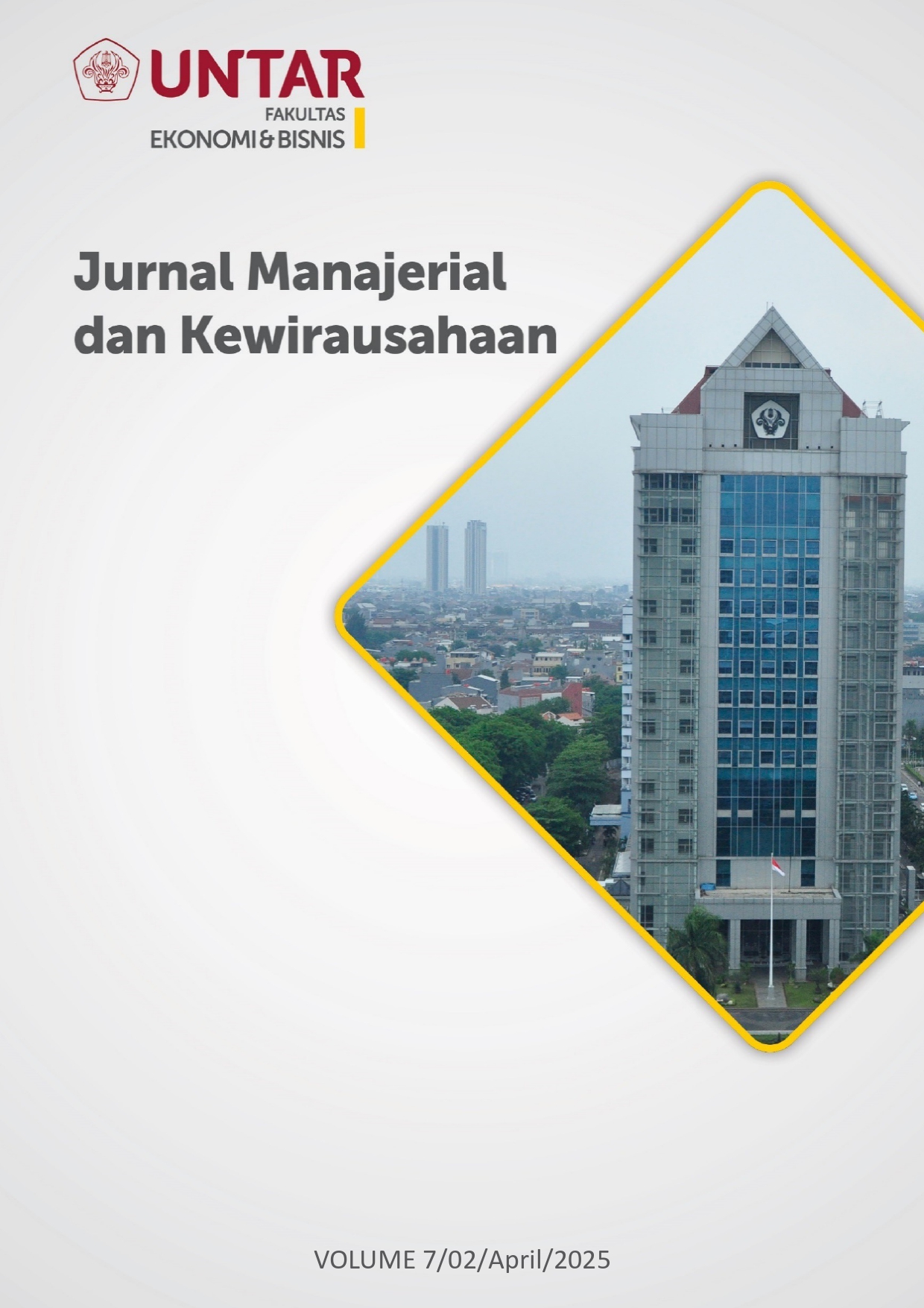Pengaruh Orientasi Kewirausahaan dan Kompetensi Kewirausahaan terhadap Kinerja Usaha pada UMKM dengan Dimediasi Keunggulan Kompetitif
Main Article Content
Abstract
Business performance plays an important role in improving business sustainability and growth. Improved performance allows MSMEs to compete more effectively and create better opportunities for business development. This study aims to analyze the effect of entrepreneurial orientation and entrepreneurial competence on business performance, with competitive advantage as mediation. Data were collected through non-probability sampling using purposive sampling technique, the sample of this study was the owners of MSMEs in West Jakarta as many as 125 respondents. Data analysis was performed with Structural Equation Modeling (SEM) using SmartPLS version 4.0. The results showed that entrepreneurial orientation has a positive but insignificant effect on business performance, while entrepreneurial competence has a positive and significant effect on business performance. In addition, competitive advantage has a positive and significant effect on business performance. Entrepreneurial orientation has a positive and significant effect on competitive advantage, and entrepreneurial competence also has a positive and significant effect on competitive advantage. The mediating effect of competitive advantage on entrepreneurial orientation is positive but insignificant to business performance. Meanwhile, the effect of entrepreneurial competence on business performance mediated by competitive advantage has a positive and significant effect. This research has an impact on business owners of F&B MSMEs in Indonesia.
Article Details
Section

This work is licensed under a Creative Commons Attribution-NonCommercial-ShareAlike 4.0 International License.
This work is licensed under a Jurnal Muara Ilmu Ekonomi dan Bisnis Creative Commons Attribution-ShareAlike 4.0 International License.,/p>
References
Aftab, J., Veneziani, M., Sarwar, H., & Ishaq, M. I. (2022). Entrepreneurial orientation and firm performance in SMEs: the mediating role of entrepreneurial competencies and moderating role of environmental dynamism. International Journal of Emerging Markets, 19(10), 3329-3352. https://doi.org/10.1108/IJOEM-07-2021-1151
Aidara, S., Al Mamun, A., Nasir, N. A. M., Mohiuddin, M., Nawi, N. C., & Zainol, N. R. (2021). Competitive advantages of the relationship between entrepreneurial competencies and economic sustainability performance. Sustainability, 13(2), 1–19. https://doi.org/10.3390/su13020864
Alharafsheh, M., & Ezmigna, A. A. R. (2023). The impact of business strategy on competitive advantage and performance of small & medium enterprises in Jordan. International Journal of Professional Business Review, 8(6), e01534. https://doi.org/10.26668/businessreview/2023.v8i6.1534
AlQershi, N. A., Abas, Z. Bin, & Mokhtar, S. S. M. (2021). The intervening effect of structural capital on the relationship between strategic innovation and manufacturing SMEs’ performance in Yemen. Management Science Letters, 21–30. https://doi.org/10.5267/j.msl.2020.8.034
Bhandari, P., & Amponstira, F. (2021). Model of Entrepreneurial Orientation, Competitive Advantage and Performance of Women-Owned Enterprises in Gandaki Province, Nepal. Open Journal of Business and Management, 09(06), 2854–2865. https://doi.org/10.4236/ojbm.2021.96159
Creswell, J. W. (2018). Educational Research Planning, Conducting, and Evaluating Quantitative and Qualitative Research-Pearson.
Etikan, I. (2016). Comparison of Convenience Sampling and Purposive Sampling. American Journal of Theoretical and Applied Statistics, 5(1), 1. https://doi.org/10.11648/j.ajtas.20160501.11
Hair, J. F., Tomas, G., Hult, M., Ringle, C. M., & Sarstedt, M. (2022). A Primer on Partial Least Squares Structural Equation Modeling (PLS-SEM).
Hernández-Perlines, F., Ariza-Montes, A., Han, H., & Law, R. (2019). Innovative capacity, quality certification and performance in the hotel sector. International Journal of Hospitality Management, 82, 220–230. https://doi.org/10.1016/j.ijhm.2019.04.027
Huda, I. U., Karsudjono, A., Maharani, P. N. (2020). Pengaruh orientasi kewirausahaan dan inovasi produk terhadap kinerja usaha kecil menengah dengan variabel intervening keunggulan bersaing (studi pada UKM di Banjarmasin). Jurnal Mitra Manajemen, 1(3), 392–407.
Hwang, W. S., Choi, H., & Shin, J. (2020). A mediating role of innovation capability between entrepreneurial competencies and competitive advantage. Technology Analysis and Strategic Management, 32(1), 1–14. https://doi.org/10.1080/09537325.2019.1632430
Ibrahim, A. U., & Abu, M. M. (2020). Influence of entrepreneurial orientation on firms performance: evidence from small and medium enterprises in Nigeria. International Journal of Economics and Financial Issues, 10(2), 99–106. https://doi.org/10.32479/ijefi.9126
Isichei, E. E., Emmanuel Agbaeze, K., & Odiba, M. O. (2020). Entrepreneurial orientation and performance in SMEs: The mediating role of structural infrastructure capability. International Journal of Emerging Markets, 15(6), 1219–1241. https://doi.org/10.1108/IJOEM-08-2019-0671
Kiyabo, K., & Isaga, N. (2020). Entrepreneurial orientation, competitive advantage, and SMEs’ performance: application of firm growth and personal wealth measures. Journal of Innovation and Entrepreneurship, 9(1). https://doi.org/10.1186/s13731-020-00123-7
Mostafiz, M. I., Hughes, M., & Sambasivan, M. (2022). Entrepreneurial orientation, competitive advantage and strategic knowledge management capability in Malaysian family firms. Journal of Knowledge Management, 26(2), 423–458. https://doi.org/10.1108/JKM-09-2020-0693
Pulka, B. M., Ramli, A., & Mohamad, A. (2021). Entrepreneurial competencies, entrepreneurial orientation, entrepreneurial network, government business support and SMEs performance. The moderating role of the external environment. Journal of Small Business and Enterprise
Development, 28(4), 586–618. https://doi.org/10.1108/JSBED-12-2018-0390
Queiroz, M. M., Pereira, S. C. F., Telles, R., & Machado, M. C. (2019). Industry 4.0 and digital supply chain capabilities: A framework for understanding digitalisation challenges and opportunities. Benchmarking, 28(5), 1761–1782. https://doi.org/10.1108/BIJ-12-2018-0435
Sugiyono. (2016). Metode Penelitian Pendidikan Pendekatan Kuantitatif, Kualitatif dan R&D. Bandung: Alfabeta.
Tehseen, S., Ahmed, F. U., Qureshi, Z. H., Uddin, M. J., & Ramayah, T. (2019). Entrepreneurial competencies and SMEs’ growth: the mediating role of network competence. Asia-Pacific Journal of Business Administration, 11(1), 2–29. https://doi.org/10.1108/APJBA-05-2018-0084
Zacca, R., & Dayan, M. (2018). Linking managerial competence to small enterprise performance within the dynamic capability logic. Journal of Small Business and Enterprise Development, 25(2), 256–276. https://doi.org/10.1108/JSBED-02-2017-0042

